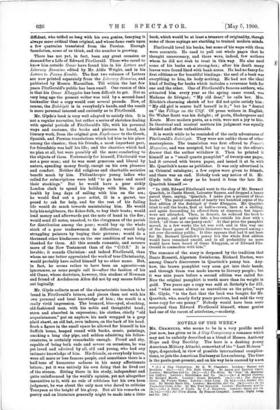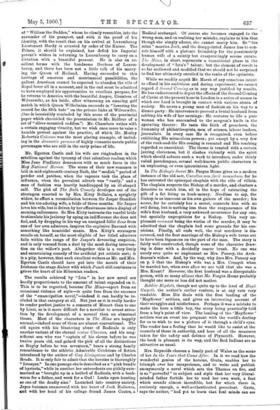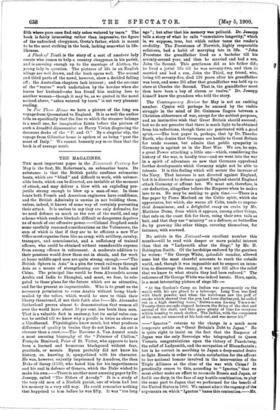NOVELS OF THE WEEK.*
MR. CHAMBERS, who seems to be in a very prolific mood just now, has given us in A Gay Conspiracy a romance which may not be unfairly described as a blend of Messrs. Anthony Hope and Guy Boothby. The hero is a dashing young American Military Attache, somewhat of the "Loot Hobson" type, despatched, in view of possible international complica- tions, to join the American Embassy at Luxembourg. The time is the paulo-post-present, and on his way he is coerced by a son • (I.) A Gay Conspiracy, By R. W. Chambers. London : Harper and Brothers. [6s.)—(2.) The Bath Comedy. By Agnes and Egerton Castle. London : Macmillan and Co. [6s.]—(3.) The Minx. By "Iota" (K. Maiming- ton CatTyn). London : Hutchinson and Co. [6s.]—(4.) A Second Coining. By Richard Marsh. London : Grant Richards. [as.]—(5.) The Bishop's Secret. By Fergus Hume. LonJon : John Long. [3s. 6d.]—(6.) Soldier Rig- dale. By Beulah Marie Dix. London : Macmillan and Co. [as ]—(7.) In the Years that Came After. By Mrs. Fred Reynolds. London : Hutchinson and Co. [6s.]—(8.) A Flash of Youth. By C. J. Hamilton. London: Sands ard co [3s. 6d.]—(9.) For Three Moons. By Frances Campbell. Loudon; Digby Lens, and Co. [6s.)
of "William the Sudden," whom be closely resembles, into the surrender of his passport, and with it the proof of his identity, with the result that on his arrival at Luxembourg Lieutenant Hardy is arrested by order of the Kaiser. The Prince, it should be explained, has defied his Imperial parent's wishes in returning to Luxembourg to carry on a flirtation with a beautiful peasant. He is also on ex- cellent terms with the handsome Duchess of Luxem- bourg, and there has been not a little talk of his marry- ing the Queen of Holland. Having succeeded to this heritage of amorous and matrimonial possibilities, the gallant American cannot be expected to abandon the rille of Royal lover all in a moment, and in the end must be admitted to have employed his opportunities to excellent purpose, for he returns to America with the beautiful Amyce, Countess of Wilverwiltz, as his bride, after witnessing an amazing golf match in which Queen Wilhelmina succeeds in "lowering the record for the fifth hole" on the private links at Wilverwiltz. (One is irresistibly reminded by this scene of the provincial paper which chronicled the presentation to Mr. Balfour of a set of "silver-mounted caddies.") Mr. Chambers writes with a certain engaging vivacity, but we wish once more to raise a humble protest against the practice, of which Mr. Morley Roberts's Colossus was the most glaring example, of includ- ing in the dramatis personae of highly romantic novels public personages who are still in the early prime of life.
Mr. Egerton Castle and his wife are ringleaders in the rebellion against the tyranny of that relentless realism which Miss Jane Findlater denounces with so much force in the May National Review. The scene of their new romance is laid in mid-eighteenth-century Bath, the " modish " period of powder and patches, when the vapours took the place of influenza, when the prevalent adverb was "vastly," and a man of fashion was heavily handicapped by an ill-shaped calf. The plot of The Bath, Comedy developes out of the stratagem resorted to by Mrs. Kitty Bellaire, a sprightly widow, to effect a reconciliation between Sir Jasper Standish and his too-adoring wife, a bride of three months. Sir Jasper loves his wife, but is driven by her effusiveness into a display of seeming callousness. So Mrs. Kitty instructs the tearful bride to stimulate his jealousy by aping an indifference she does not feel, and, by dropping in his way an unsigned billet doux from one of her own admirers, inspires the explosive Baronet with something like homicidal mania. Mrs. Kitty's stratagem recoils on herself, as the most eligible of her titled admirers falls within the range of Sir Jasper's devouring suspicion, and is only rescued from a duel by the most daring interven- tion on the widow's part. Altogether this is a very lively and entertaining comedy of the artificial yet artistic sort ; it is a pity, however, that such excellent writers as Mr. and Mrs. Egerton Castle should have put into the mouth of their Irishman the stage dialect with which Punch still continues to grieve the heart of his Hibernian readers.
The results achieved by "Iota" in her new novel are hardly proportionate to the amount of talent expended on it. This is to be regretted, because The Minx—apart from an occasional violence of style—is quite free from the excesses of the "emancipation novel,"—indeed it can hardly be in- cluded in that category at all. But just as it is really harder to render perfect justice to a concerto of Mozart than to one by Liszt, so is it more difficult for a novelist to arrest atten- tion by the development of a normal than an abnormal theme. Most of the characters in The Minx are happily normal,—indeed some of them are almost conventional. The old squire with his blustering abuse of Radicals is only another variant of the eternal iratus Chremes, and his mag- nificent son who was "captain of his eleven before he was twelve years old, and gained the pick of all the distinctions at Rugby before he was seventeen," bears a strong family resemblance to the athletic Admirable Crichtons of fiction introduced by the author of Guy Livingstone and by Charles Reade. It is only fair to admit that the heroine is thoroughly " Iotesque." In one passage she is described as a "pink bundle of hysteria," while in another her antecedents are pithily sum- marised as "brought up in a hotbed of Radicals, with a book. worm for a father, and work for a God ! Looks upon hunting as one of the deadly sins." Launched into country society, Joyce becomes enamoured with her heart of Jock Hallowes, and with her head of his college friend James Coates, a
Radical archangel. Of course she becomes engaged to the wrong man, and on realising her mistake, explains to him that though she simply adores, she cannot marry him. So "the minx" marries Jock, and the disappointed James has to con- sole himself with a platonic friendship for the passionately human wife of a saintly but exasperatingly serene curate. Re Minx, in short, represents a transitional phase in the development of " Iota's " talent; but the element of revolt is so far mellowed and modified that we should not be surprised to find her ultimately enrolled in the ranks of the optimists.
While we readily acquit Mr. Marsh of any conscious intent to offend in his ambitious and daring experiment, we cannot regard A Second Coming as in any way justified by results. He has endeavoured to depict the effects of the Second Coming of Christ at the present hour in London in a series of scenes in which our Lord is brought in contact with various strata of society. He meets a young man of fashion on his way to a dinner-party : He intervenes to prevent a brutal husband from robbing his wife of her earnings : He restores to life a poor woman who has succumbed to the surgeon's knife in the operating theatre : He tests the faith of preachers, the humanity of philanthropists, men of science, labour leaders, journalists. In every case He is recognised, even before exhibiting His miraculous powers ; yet except by a very few of the rank-and-file His coming is resented and His teaching regarded as anarchical. The theme is treated with a certain jarring cleverness, but it clashes violently with the spirit which should actuate such a work to introduce, under thinly veiled pseudonyms, several well-known public characters in an unpleasing, or even ignominious, light.
In The Bishop's Secret Mr. Fergus Hume gives us a modern instance of the old saw, Cucullus non facit monachum, for he has entrusted the episcopal chaplain with the role of villain. The chaplain suspects the Bishop of a murder, and charters a detective to watch him, all in the hope of extracting the gift of a fat living as hush-money. Needless to say, the Bishop is as innocent as his own gaiters of the murder ; his secret, for he certainly has a secret, connects him with no evil doing, but is nothing less than the reappearance of his wife's first husband, a very awkward occurrence for any one, but specially unpropitious for a Bishop. This very un- pleasant revenant being the victim of the murder, it may be admitted that the chaplain had some grounds for his sus. Dicione. Finally, all ends well, the real murderer is dis- covered, and the first marriage of the Bishop's wife turns out to have been bigamous on the part of the man. The story is fairly well constructed, though some of the character draw- ing is done with a decidedly coarse brush. No one was surely ever quite so unpleasant as Mrs. Pansey, the Arch- deacon's widow. And, by the way, why does Mrs. Pansey say on p. 5 that the Bishop's wife was a Mrs. Creagth when he married her, when ever after we are told that she was a Mrs. Kraut? However, the first husband was a disreputable person, with so many aliases that Mr. Fergus Hume probably thought one more or less did not matter.
Soldier Rigdale, though not quite up to the level of Hugh Gwyeth, the author's earlier venture, is at any rate very readable. Miss Dix deals with the first landing of the ' Mayflower ' settlers, and gives an interesting account of their struggles and misfortunes. Perhaps it was a mistake to make the hero a little boy, the story being practically told from a boy's point of view. The landing of the ' Mayflower ' settlers was an event too pregnant with the world's destiny for us to wish to see a picture of it through a child's eyes. The reader has a feeling that he would like to assist at the councils of those in authority, and hear of all the measures taken for the safety and defence of Plymouth. However, the book is pleasant is its way, and the Red Indians are as attractive as usual.
Mrs. Reynolds chooses a lonely part of Wales as the scene of her In. the Years that Came After. In it we read how the wonderful genius of the heroine, Greta, enables her to triumph over her inexperience, and to write and publish anonymously a novel which sets the Thames on fire, and is so " powerful " in subject and style that her very liberal- minded father forbids her to read her own work, a feat which sounds almost incredible, but for which there is, curiously enough, a well-authenticated precedent. Greta, says the author, "had yet to learn that foal minds can see filth where pure ones find only ashes watered by tears." The book is fairly interesting rather than impressive, the figure of the unfrocked clergyman, Greta's father, which is meant to be the most striking in the book, lacking somewhat in life- likeness.
A Flash of Youth is the story of a sort of amateur lady curate who comes to help a country clergyman in his parish, and is amusing enough up to the marriage of Aletbea, the young lady in question. The pictures of life in an English village are well drawn, and the book opens well. The second and third parts of the novel, however, show a decided falling off ; the Australian chapters lack interest ; and the account of the " rescue " work undertaken by the heroine when she leaves her husband—she has found him making love to another woman—though it may be, as we quoted in the novel noticed above, "ashes watered by tears," is not very pleasant reading.
In For Three Moons we have a picture of the long sea voyage from Queensland to England. It is as well the author tells us specifically that the line to which the steamer belongs is a small one, for imagination faints before the picture of snch a dreadful dipsomaniac as Harry Vivian disgracing the decorous decks of the "P. and 0." By a singular slip, the voyage from Gibraltar home is spoken of as being "past the coast of Italy.- We cannot honestly say more than that the book is of average merit.








































 Previous page
Previous page